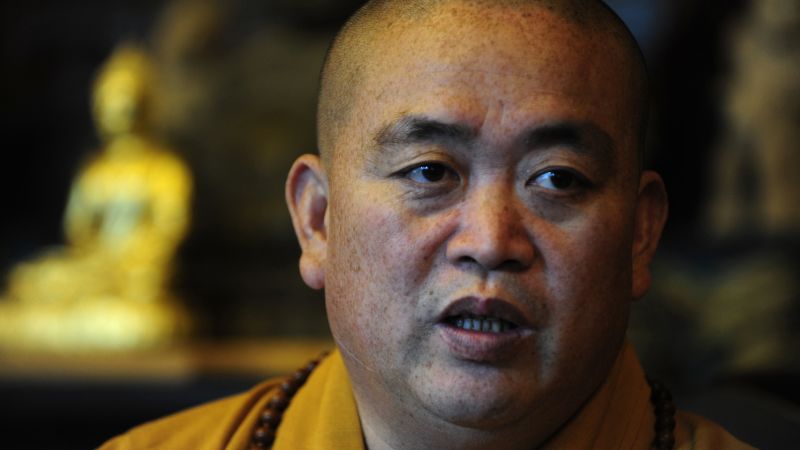Hong Kong —
China’s famed Shaolin Temple announced on Sunday that its abbot is under investigation for suspected embezzlement and “improper relationships” with women, reviving decade-old allegations against the controversial, high-profile monk.
Shi Yongxin, known as “CEO monk” for his entrepreneurial endeavors that transformed the Buddhist monastery into a commercial empire, is suspected of criminal offenses including embezzlement and misappropriation of project funds and temple assets, the temple’s authority said in a statement.
The 59-year-old monk was also accused of seriously violating Buddhist precepts by maintaining “improper relationships” with multiple women over an extended period and fathering at least one child, according to the statement.
Ad Feedback
Ad Feedback
Buddhist monks in China have traditionally been expected to take a vow of celibacy.
“(Shi) is currently under joint investigation by multiple departments. Further information will be released to the public in due course,” the statement added.
CNN has not been able to contact Shi.
Established more than 1,500 years ago in the forested mountains of central China, the Shaolin Temple is both a religious and cultural icon, renowned for its age-old tradition of Zen Buddhism and Shaolin kung fu – a distinct form of Chinese martial arts.
Shi, who became the abbot of the Shaolin Temple in 1999 and was a member of China’s rubber-stamp parliament for two decades, has frequently appeared in the media spotlight.
Known as the first Chinese abbot to hold a Master of Business Administration degree, he was often seen globetrotting with an iPhone in hand, meeting world leaders and industry titans – from the late Queen Elizabeth II of Great Britain, late South African president Nelson Mandela, and Henry Kissinger to Apple CEO Tim Cook.
In February, Shi led a delegation of monks from the Shaolin Temple to the Vatican to meet with Pope Francis.
But unflattering headlines have dogged the Buddhist monk for years – including his acceptance of a 1 million yuan ($140,000) car from the local government as a reward for promoting tourism in 2006.
Responding to a public outcry at the time, Shi told state media: “Monks are also citizens. We have fulfilled our duties and made contributions to society, so it is only right that we receive rewards.”
His focus on promoting the Shaolin brand and turning it to multimillion-dollar business has attracted fierce criticism, especially from some followers who saw excessive commercialization as corrupting the spiritual integrity of the religious institution.
He staged Shaolin kung fu performances around the world, licensed the temple’s name out to cartoons, movies and video games, and established a business empire that includes publishing, traditional Chinese medicine, tourist development and real estate.
For his part, Shi has defended his efforts to commercialize the Shaolin brand and promote it globally.
After writing a $3 million check to an Australian town in 2015 to build a Shaolin branch there, Shi Yongxin told state-run Xinhua news agency: “If China can import Disney resorts, why can’t other countries import the Shaolin Monastery?”
“Cultural promotion is a very dignified undertaking,” he said.
Later that year, a self-identified Shaolin insider posted a series of explosive allegations on Chinese social media, depicting Shi as an embezzler and womanizer with illegitimate children.
The accuser included documents dating back to the late 1980s purportedly showing Shi being kicked out of Shaolin following theft and other accusations from his own master. Among the documents posted online was a birth certificate for one of the abbot’s supposed illegitimate children, as well as photos of the alleged mother and the child.
The allegations prompted an angry denial from the Shaolin Temple and an investigation from the country’s religious affairs authorities. Asked by BBC Chinese at the time about the allegations, Shi said: “If there were a problem, it would have surfaced long ago.”
The authorities dropped the case in 2017, citing insufficient evidence. Three years later, Shi went on to be re-elected as the deputy head of the Buddhist Association of China – the state supervisory body on the religion – a position he has held since 2002, according to state media.
On Monday, the Buddhist Association of China said in a statement that Shi had been stripped of his ordination certificate – an official proof of a monk’s or nun’s qualification to enter monastic life.
“Shi Yongxin’s actions are of an extremely egregious nature, severely tarnishing the reputation of the Buddhist community and damaging the image of monastics,” the association said.
“The Buddhist Association of China firmly supports and endorses the decision to handle Shi Yongxin’s case in accordance with the law.”
Steven Jiang contributed to this report.
